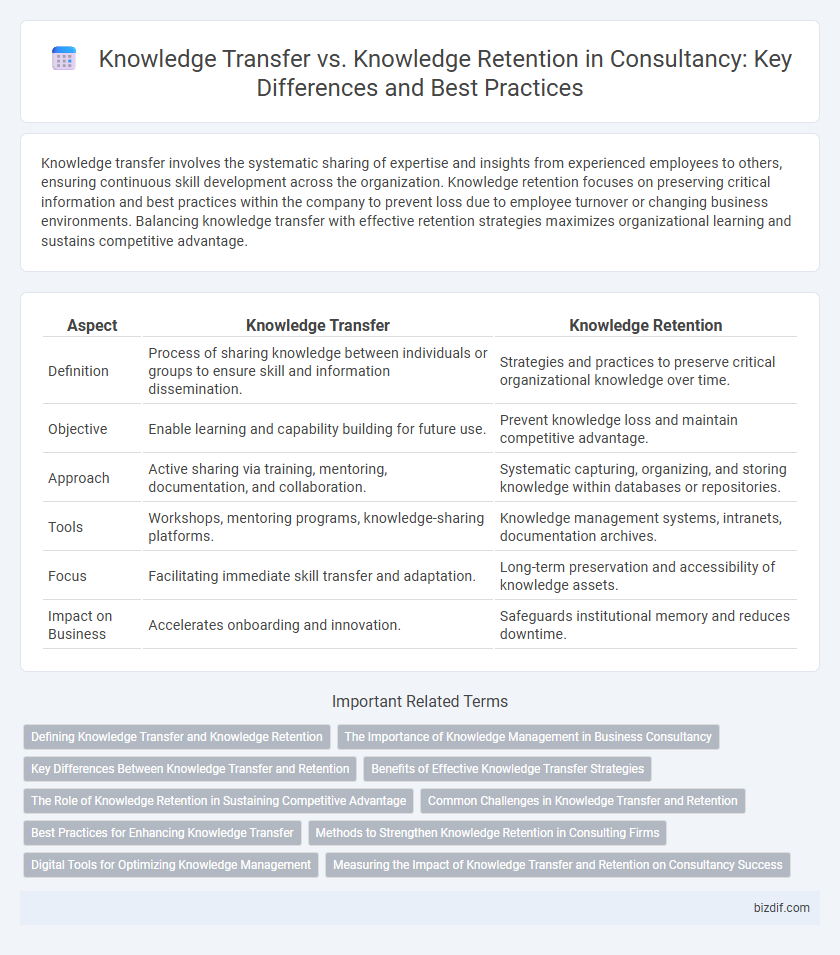Knowledge transfer involves the systematic sharing of expertise and insights from experienced employees to others, ensuring continuous skill development across the organization. Knowledge retention focuses on preserving critical information and best practices within the company to prevent loss due to employee turnover or changing business environments. Balancing knowledge transfer with effective retention strategies maximizes organizational learning and sustains competitive advantage.
Table of Comparison
| Aspect | Knowledge Transfer | Knowledge Retention |
|---|---|---|
| Definition | Process of sharing knowledge between individuals or groups to ensure skill and information dissemination. | Strategies and practices to preserve critical organizational knowledge over time. |
| Objective | Enable learning and capability building for future use. | Prevent knowledge loss and maintain competitive advantage. |
| Approach | Active sharing via training, mentoring, documentation, and collaboration. | Systematic capturing, organizing, and storing knowledge within databases or repositories. |
| Tools | Workshops, mentoring programs, knowledge-sharing platforms. | Knowledge management systems, intranets, documentation archives. |
| Focus | Facilitating immediate skill transfer and adaptation. | Long-term preservation and accessibility of knowledge assets. |
| Impact on Business | Accelerates onboarding and innovation. | Safeguards institutional memory and reduces downtime. |
Defining Knowledge Transfer and Knowledge Retention
Knowledge transfer involves the systematic sharing of expertise, skills, and insights within an organization to enhance collective performance and innovation. Knowledge retention focuses on preserving critical organizational knowledge to prevent loss due to employee turnover or operational changes, ensuring continuity and sustained competitive advantage. Both processes are essential in consultancy for maintaining intellectual capital and enabling effective decision-making.
The Importance of Knowledge Management in Business Consultancy
Effective knowledge management in business consultancy hinges on balancing knowledge transfer and knowledge retention to ensure organizational continuity and competitive advantage. Knowledge transfer facilitates the seamless sharing of expertise among consultants and clients, accelerating problem-solving and innovation, while knowledge retention safeguards critical insights and best practices against employee turnover. Prioritizing both processes enhances decision-making, fosters a culture of learning, and drives sustained business growth.
Key Differences Between Knowledge Transfer and Retention
Knowledge Transfer involves actively sharing expertise, skills, and information between individuals or teams to enhance organizational performance and innovation. Knowledge Retention focuses on safeguarding critical knowledge within an organization by capturing, documenting, and preserving intellectual assets to prevent loss during employee turnover. Key differences include the dynamic sharing process in Knowledge Transfer versus the static preservation goals in Knowledge Retention, with the former driving immediate collaboration and the latter ensuring long-term organizational memory.
Benefits of Effective Knowledge Transfer Strategies
Effective knowledge transfer strategies enhance organizational agility by enabling seamless sharing of critical expertise and best practices across teams. These strategies reduce operational risks associated with employee turnover by preserving institutional knowledge and facilitating continuous learning. Improved collaboration and innovation result from structured knowledge transfer processes that ensure timely access to relevant information and insights.
The Role of Knowledge Retention in Sustaining Competitive Advantage
Knowledge retention plays a critical role in sustaining competitive advantage by ensuring that valuable organizational knowledge is preserved and accessible for future use, reducing the risk of knowledge loss due to employee turnover. Effective knowledge retention strategies, such as creating comprehensive documentation, implementing knowledge management systems, and fostering a culture of continuous learning, enable companies to maintain operational continuity and accelerate innovation cycles. This proactive approach not only safeguards intellectual capital but also enhances decision-making efficiency and supports long-term strategic goals.
Common Challenges in Knowledge Transfer and Retention
Common challenges in knowledge transfer and retention include overcoming employee turnover, which leads to significant loss of critical organizational knowledge. Misalignment between knowledge management systems and daily workflows often results in poor accessibility and underutilization of stored information. Cultural barriers and lack of standardized processes further hinder effective knowledge sharing and long-term retention.
Best Practices for Enhancing Knowledge Transfer
Effective knowledge transfer hinges on structured documentation, interactive training sessions, and leveraging digital collaboration platforms to ensure seamless communication across teams. Establishing mentorship programs and embedding knowledge sharing into organizational culture enhances retention by promoting continuous learning and reducing information silos. Utilizing knowledge management systems with searchable databases centralizes critical insights, facilitating quick access and sustained organizational memory.
Methods to Strengthen Knowledge Retention in Consulting Firms
Implementing structured mentoring programs and comprehensive documentation systems significantly enhances knowledge retention in consulting firms by capturing critical insights and best practices. Utilizing knowledge management platforms with real-time collaboration tools ensures seamless information flow and preserves institutional expertise. Regular training sessions combined with feedback loops promote continuous learning and embed valuable knowledge within the organizational culture.
Digital Tools for Optimizing Knowledge Management
Digital tools for optimizing knowledge management enhance knowledge transfer by facilitating seamless collaboration through platforms like SharePoint and Slack, enabling real-time information sharing across teams. Knowledge retention improves with AI-powered systems that automatically capture, organize, and archive critical business insights, such as knowledge bases powered by tools like Confluence or Guru. Leveraging machine learning algorithms, these digital solutions analyze usage patterns to recommend relevant content, ensuring organizational knowledge remains accessible and up-to-date.
Measuring the Impact of Knowledge Transfer and Retention on Consultancy Success
Measuring the impact of knowledge transfer and retention on consultancy success involves analyzing key performance indicators such as project delivery times, client satisfaction, and employee expertise development. Effective knowledge transfer accelerates the onboarding process and reduces errors, while robust knowledge retention safeguards institutional memory and innovation continuity. Quantitative metrics like reduced rework rates and qualitative assessments from client feedback provide vital insights into the tangible benefits of knowledge management strategies in consultancy.
Knowledge Transfer vs Knowledge Retention Infographic

 bizdif.com
bizdif.com